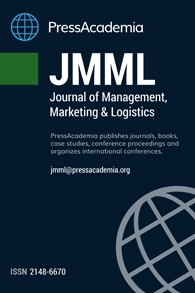WORD OF MOUTH MARKETING: AN EMPIRICAL INVESTIGATION IN HEALTHCARE SERVICES
WORD OF MOUTH MARKETING: AN EMPIRICAL INVESTIGATION IN HEALTHCARE SERVICES
A considerable number of studies assert that word of mouth marketing is effective on customer preferences. It is also regarded as a form of promotion especially in professional services, where confidence plays a pivotal role. This study aims to identify advice giving and receiving habits regarding healthcare services. In addition, we also intend to measure the reaction of healthcare service receivers in accordance with their satisfaction and dissatisfaction outcome and to associate it with their demographic characteristics. The empirical results suggest that word of mouth marketing affects customer preferences in healthcare services. We also detect a limited relationship between demographic characteristics and word of mouth marketing.
Keywords:
Word of mouth marketing service industry, health care services, consumer’s preference, demographic features,
___
- Anderson, E. W. 1998, “Costumer Satisfaction and Word of Mouth”, Journal of Service Research, say. 1, no.1, 5-17.
- Ateşoğlu, İ. & Bayraktar, S. 2011, “Ağızdan Ağıza Pazarlamanın Turistlerin Destinasyon Seçimindeki Etkisi”, Zonguldak Karaelmas Üniversitesi Sosyal Bilimler Dergisi, say. 7, no. 14, 95-108.
- Chaniotakis, I. E. & Lymperopoulos, C. 2009, “Service Quality Effect on Satisfaction and Word of Mouth in the Health Care Industry”, Managing Service Quality: An International Journal, say. 19, no. 2, 229-242.
- Feick, L. F. & Price, L. L. 1987, “The Market Maven: A Diffuser of Marketplace Information”, Journal of Marketing, say. 51, 83-97.
- Kang, J. & Hustvedt, G. 2014, “Building Trust Between Consumers and Corporations: The Role of Consumer Perception of Transparency and Social Responsisbility”, Journal of Bussines Ethics, say. 125, 253-265.
- Keller, E. 2007, “Unleasing the Power of Word of Mouth: Creating Brand Advocacy to Drive Growth”, Jornal of Advertising Research, say. 47, no. 4, 448-452.
- Khalid, S., Ahmed, M. A. & Ahmad, Z. 2013, “Word-of-Mouth Communications: A Powerful Contributor to Consumers Decision-Making in Healthcare Market”, International Journal of Business and Management Invention, say.2, no.5, 55-64.
- Kılınç, C. Ç. 2007–2008, “Sağlık Sektöründe Faaliyette Bulunan Hastane İşletmelerinde Müşteri İlişkileri Yönetimi Üzerine Bir Araştırma”, Review of Social, Economic & Business Studies, say. 9/10, 309-332.
- Kutluk, A. & Avcıkurt, C. 2014, “Ağızdan Ağıza Pazarlamanın Müşterilerin Satın Alma Karar Süreçlerine Etkisi ve Bir Uygulama: İstanbul Seyahat Acenteleri Örneği”, Journal of International Social Research, say. 7, no. 29, 613-622.
- Naik, R. K., Anand, B. & Bashir, I. 2013, “Healthcare Service Quality and Word of Mouth: Key Drivers to Achieve Patient Satisfaction”, Pacific Business Review International, say. 5, no. 12, 39-44.
- Peres, R. & Bulte, C. V. 2014, “When to Take or Forgo New Product Exclusivity: Balancing Protection from Competition Against Word-of- Mouth Spillover”, Journal of Marketing, say. 78, 83-100.
- Podoshen, J. S. 2008, “The African American Consumer Revisited: Brand Loyalty, Word-of Mouth and The Effects of The Black Experience”, Journal of Consumer Marketing, say. 25, no. 4, 211-222.
- Trusov, M., Bucklin, R. E. & Pauwels, K. 2009, “Effect of Word of Mouth versus Tradional Marketing: Finding from an Internet Social Networking Site”, Journal of Marketing, say. 73, no. 5, 90-102.
- Uzunal, B. & Uydacı, M. 2010, “Sağlık Kurumlarında Ağızdan Ağıza Pazarlama ve Bir Pilot Çalışma”, Öneri Dergisi, say. 9, vol. 34, 87- 95.
- Whyte, W. H. 1954, “The Web of Word of Mouth”, Fortune, say. 50, no. 5, 140-143.
- Yılmaz, E. 2011, “Sağlık Hizmetlerinde Ağızdan Ağıza Pazarlama”, Marmara Sosyal Araştırmalar Dergisi, say. 1, 1-19.
- Zhang, Y., Feick, L. & Mittal, V. 2014, “How Males and Females Differ in Their Likelihood of Transmitting Negative Word of Mouth”, Journal of Consumer Research, say. 40, 1097-1108.
- Yayın Aralığı: Yılda 4 Sayı
- Başlangıç: 2014
- Yayıncı: PressAcademia
Sayıdaki Diğer Makaleler
AN ANALYSIS OF LOGISTICS VILLAGES IN TURKEY: HALKALI AND YENICE
COMPETITION ANALYSIS OF CONSUMER ELECTRONICS RETAILING NETWORKS IN TURKEY
Aykan CANDEMİR, Erhan ZALLUOGLU, Cihat KARSLİ, Asli DİYADİN
Ahmet Zafer ACAR, Arda BALAKAN
THEORETICAL JOURNEY OF TALENT MANAGEMENT: EGALITARIAN AND ELITIST APPROACH
Hatice Genc KAVAS, Mehmet Celal GULTEKİN, Omer Fazil EMEK
ANALYZING THE EFFECTS OF PERSONALITY TRAITS ON MOTIVATIONS FOR USING SOCIAL MEDIA
Mutlu Yuksel AVCİLAR, Banu Kulter DEMİRGUNES
WHERE TO PRESENT THE ADVERTISEMENT IN A BLOCK?
WORD OF MOUTH MARKETING: AN EMPIRICAL INVESTIGATION IN HEALTHCARE SERVICES
Cengiz DURAN, Aysel Cetindere FİLİZ, Arzu CETİNDERE, Suleyman TİRYAKİ
